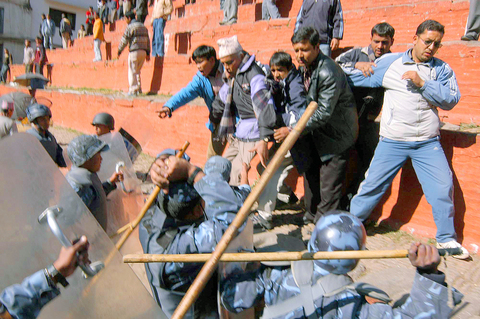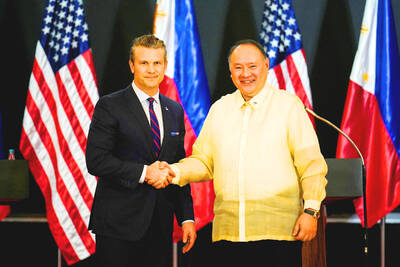Police kept tight security in place in Nepal's capital yesterday, as political parties vowed more protests against King Gyanendra's rule despite hundreds of arrests in recent days.
An alliance of seven parties has called for a nationwide strike on Thursday.
On Saturday police arrested more than 230 people after anti-royal demonstrators in Kathmandu clashed with officers who used tear gas and carried firearms in place of their usual bamboo batons.

PHOTO: AP
"Most of the people detained during Saturday's clashes were released late on Saturday night, and 61 remained in custody," said a police officer on condition of anonymity.
Around 150 political and human rights activists who were rounded up on Thursday and Friday remained in detention, the police officer added.
Opposition politicians vowed to keep up the protest program, calling a nationwide general strike for Thursday and planning district-level protests in an attempt to disrupt planned municipal elections.
"The people's movement has come to a new height and will not come to an end unless full democracy is restored," Shobhakar Parajuli, secretary of the Nepali Congress Party, said.
Another opposition leader condemned the government's use of force.
"The effects of the protests are getting very strong because the government is indulging in unnecessary actions by using excessive force," said K.P. Oli, a senior leader of the Nepal Communist Party (United Marxist Leninist).
"The government is suppressing people and we don't have any alternative but to continue protests," said Oli, who is under house arrest.
The parties have called for a boycott of local elections planned for Feb. 8 by Gyanendra, who is under increased international pressure to restore democracy after he sacked the elected government almost a year ago.
On Saturday groups of stone-throwing protesters clashed with police in running battles around Kathmandu's main square after a larger pro-democracy rally was banned.
Police arrested 236 people, an officer said later. Journalists and other eyewitnesses reported that some 300 demonstrators were rounded up and bundled into police vans.
Meanwhile, Maoist rebels and government forces clashed overnight in a village in southern Nepal, killing 14 militants and six security forces, the royal army said yesterday.
The gunbattle began on Saturday night after the insurgents attacked a security patrol in Phapar Badi village, 160km south of Kathmandu, an official at the Royal Nepalese Army headquarters said.

‘EYE FOR AN EYE’: Two of the men were shot by a male relative of the victims, whose families turned down the opportunity to offer them amnesty, the Supreme Court said Four men were yesterday publicly executed in Afghanistan, the Supreme Court said, the highest number of executions to be carried out in one day since the Taliban’s return to power. The executions in three separate provinces brought to 10 the number of men publicly put to death since 2021, according to an Agence France-Presse tally. Public executions were common during the Taliban’s first rule from 1996 to 2001, with most of them carried out publicly in sports stadiums. Two men were shot around six or seven times by a male relative of the victims in front of spectators in Qala-i-Naw, the center

Incumbent Ecuadoran President Daniel Noboa on Sunday claimed a runaway victory in the nation’s presidential election, after voters endorsed the young leader’s “iron fist” approach to rampant cartel violence. With more than 90 percent of the votes counted, the National Election Council said Noboa had an unassailable 12-point lead over his leftist rival Luisa Gonzalez. Official results showed Noboa with 56 percent of the vote, against Gonzalez’s 44 percent — a far bigger winning margin than expected after a virtual tie in the first round. Speaking to jubilant supporters in his hometown of Olon, the 37-year-old president claimed a “historic victory.” “A huge hug

Two Belgian teenagers on Tuesday were charged with wildlife piracy after they were found with thousands of ants packed in test tubes in what Kenyan authorities said was part of a trend in trafficking smaller and lesser-known species. Lornoy David and Seppe Lodewijckx, two 19-year-olds who were arrested on April 5 with 5,000 ants at a guest house, appeared distraught during their appearance before a magistrate in Nairobi and were comforted in the courtroom by relatives. They told the magistrate that they were collecting the ants for fun and did not know that it was illegal. In a separate criminal case, Kenyan Dennis

The US will help bolster the Philippines’ arsenal and step up joint military exercises, Manila’s defense chief said, as tensions between Washington and China escalate. The longtime US ally is expecting a sustained US$500 million in annual defense funding from Washington through 2029 to boost its military capabilities and deter China’s “aggression” in the region, Philippine Secretary of Defense Gilberto Teodoro said in an interview in Manila on Thursday. “It is a no-brainer for anybody, because of the aggressive behavior of China,” Teodoro said on close military ties with the US under President Donald Trump. “The efforts for deterrence, for joint resilience